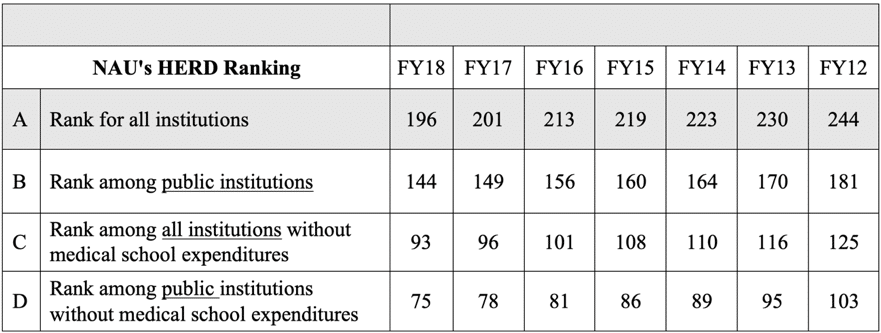For the first time in its 120-year history, Northern Arizona University broke through the country’s top 200 research universities, reaching No. 196 in the National Science Foundation’s (NSF) national research rankings.
According to just-released NSF rankings, which take into account research expenditures, NAU also rose to No. 93 for universities without a medical school and No. 75 in the nation for public institutions without a medical school.
The NSF’s Higher Education Research and Development (HERD) annual survey ranks more than 900 colleges and universities and is the primary source of information on research and development expenditures.
NAU’s climb is attributed to a 15 percent increase in research expenditures from 2017 to nearly $53 million in 2018.
Breaking into these elite ranks has been an important goal for President Rita Cheng since arriving at NAU in 2014. She says it represents the university’s commitment to and investment in research that is vital to students, faculty and the state.
“These rankings reflect the achievements of NAU’s world-class faculty, dedicated research and support staff and talented graduate and undergraduate students,” Cheng said. “These rankings also are attributed to the vision and determination of academic and research leadership throughout the NAU campus.
“I would like to congratulate our expert faculty on this national recognition. They are at the peak of their disciplines and I’m proud of the impact of their work. We are dedicated to teaching students to thrive in this new knowledge and technology-driven economy. Our faculty serve as mentors and role models to our students, a critical component of the graduate and undergraduate learning experience.”
Paul Keim, NAU Regents’ Professor and executive director of the Pathogen and Microbiome Institute and a world-renowned expert on genomic analysis, says he is proud of NAU expanding its boundaries of knowledge in recent years.
“NAU’s research programs have been increasing steadily and consistently over the last few years,” Keim said. “Breaking into the top 100 is the result of hard work and perseverance by the entire NAU research community. Our advances are sustainable and will continue well into the future.”
These new rankings highlight how much research at NAU has grown in the past few years, said David Trilling, NAU professor of astronomy.
“While we’re learning about the world in new and exciting ways, we’re also training students how research is done—skills that will help them for the rest of their lives,” Trilling said.
The annual ranking of U.S. universities by level of research activity considers total research expenditures, types of research and the number of personnel who participate in research and development.

While NAU is at the leading edge of research in physics, astronomy, climate and environmental science, ecology, forest health and land management and microbiology, these rankings demonstrate a breadth of expertise across disciplines. Those include science, health and social sciences, with a focus on top-tier research, including increased research activity in emerging fields such as cyber systems and informatics, health equity, planetary sciences, bioengineering and material science.
“This NSF recognition brings well-deserved attention to NAU’s outstanding research programs,” said Julie Baldwin, NAU Regents’ Professor and director of the Center for Health Equity Research. “As one example, our Center for Health Equity Research and the Southwest Health Equity Research Collaborative funded by the National Institute on Minority Health and Health Disparities (NIMHD) are building research capacity to address health inequities in our region.”
NAU’s national recognition in research helps attract and retain exceptional faculty and enhances experiential learning and undergraduate and graduate student research opportunities. It also grows and strengthens programs leading to degrees in high-demand fields, leading to further developing Arizona’s workforce, supporting jobs for students, faculty and staff, expanding the state’s economy and benefitting communities locally and throughout the world.



